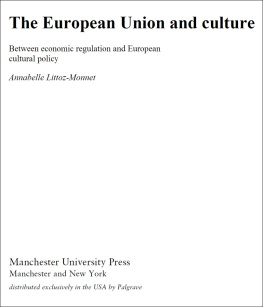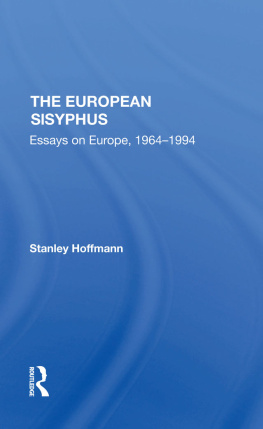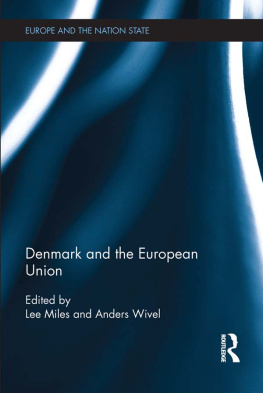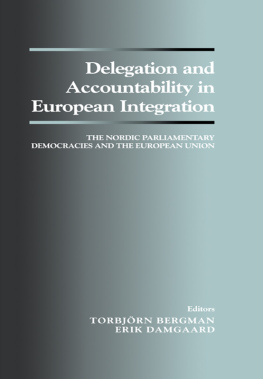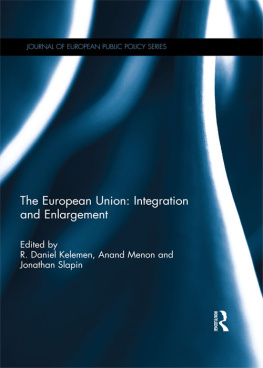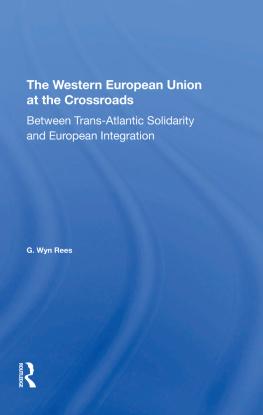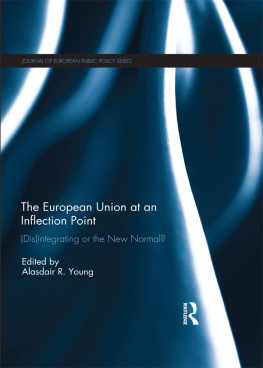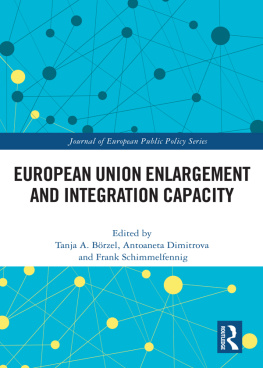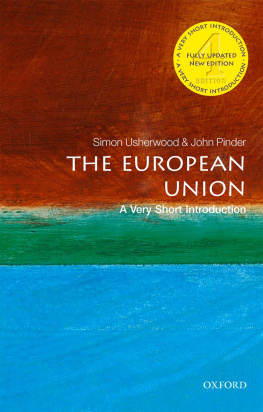Praise for The Desperate Union
This is a remarkable book. It is also an important book because it is about a structural flaw that poses a fatal risk to the monetary union. This flaw is the disregard of the cultural differences that exist within the borders of the European Union. What is remarkable about it is that in addition to official statistics Ewoud van Laer has used detective stories to support his theory. Readers will encounter Inspector Maigret, for example. A well-documented and well-written book.
Frits Bolkestein, European Commissioner, 19992004
While I do not agree with all of Ewoud van Laers conclusions I found his analysis of the deep cultural and historical roots that separate northern and southern Europe fascinating. His book is essential reading for anyone trying to understand the present deep tensions within the EU.
Nick Clegg, deputy prime minister of the United Kingdom, 20102016
You need to read this book to understand that Brexit did not come out of nowhere and that we are at a crossroads with regard to the future of our union. Restoring mutual trust by gaining a better understanding of one anothers backgrounds would appear to be the solution. Ewoud van Laer provides guidance for this in his book a must read for anyone who feels involved with the European Union.
Hans Bartelds, chairman of Fortis, 19902002
I found it very interesting that cultural differences a topic that many people know about at a general level have now been set out on paper and examined in depth, illustrated by very relatable and original examples.
Ina Giscard dEstaing, charge de mission of the Louvre Museum
I have always had my doubts about the monetary union, largely based on my own personal experiences at a great many international meetings. In this book Ewoud van Laer clearly demonstrates the issues we found ourselves wrestling with and how deeply value systems are ingrained in us.
Andr Szsz, executive director of the Dutch Central Bank with responsibility for international monetary relations, 197394
In this extremely clearly argued book, Ewoud van Laer demonstrates that we are trapped in a cultural and monetary dilemma. The tenability of the monetary union calls for further integration whilst the priority for people at the moment is maintaining their own way of life. There are no economic models that are able to cope with this dilemma.
Professor Casper de Vries, Witteveen chair of Monetary Economics at Erasmus University
It is primarily the combination of hard facts and the examples drawn from literature and real life that make this an important and original book. It transpires that cultural differences are highly significant to the European integration process.
Edgar du Perron, justice of the Dutch Supreme Court and professor of Private Law at the University of Amsterdam
UNION BRIDGE BOOKS
An imprint of Wimbledon Publishing Company Limited (WPC)
UNION BRIDGE BOOKS
7576 Blackfriars Road
London SE1 8HA
www.unionbridgebooks.com
Original title: De wanhopige unie
First published: WalburgPers, Zutphen 2017
Copyright Ewoud van Laer 2017
English translation: Abacus Translation
Copyright Ewoud van Laer 2020
The author asserts the moral right to be identified as the author of this work.
All rights reserved. No part of this publication may be reproduced in any form or by any means without written permission of the publisher.
The moral rights of the author have been asserted in accordance with the Copyright, Designs and Patents Act 1988.
A CIP record for this book is available from the British Library.
Library of Congress Cataloging-in-Publication Data
Library of Congress Control Number: 2019952778
ISBN-13: 978-1-78527-174-8 (Pbk)
ISBN-10: 1-78527-174-1 (Pbk)
This title is also available as an e-book.
In 1979, the young Ewoud van Laer took his first job at the Dutch Ministry of Finance. Since he was so junior he was soon appointed Mr Euro: charged with keeping an eye on the project of European monetary integration, which everyone knew wasnt going to happen anyway.
Decades later, as a fund manager working for stockbrokers and banks, he watched the euro come into existence and swiftly hit trouble. Travelling around Europe, speaking many languages, Van Laer came to feel that the problems werent simply economic. Beneath the European Union lay a deep but rarely mentioned cultural fault line between north and south. Bizarrely, the divide seemed to track the path of the limes: the nearly two-thousand-year-old border that the Romans drew along the Rhine and Danube between their own empire and the unconquered Germanic tribes.
His clear, provocative and commendably brief book tracks this fault line and asks how the EU can live with it. Through an imaginative reading of everything from detective novels to data compiled by international institutions, Van Laer argues that the basic difference between the north and south of the continent is power distance. Northern Europeans tend to treat people, even the boss, more or less as equals; southern Europeans observe strict hierarchies in which the top people cannot be challenged. In Latin countries, the boss is free to break the rules; and the only way the people at the bottom can get what they want is to break them, too.
Van Laer (who identifies unapologetically with northern Europe) argues that power distance creates northsouth differences in almost every realm: in employeremployee relations, the independence of judges, willingness to invest in common projects and so on. For centuries now, the cooperative and transparent north has grown faster than the distrustful, hierarchical south. The widening economic divide has created its own difficulties, as witness the tensions over the euro. Northerners feel they are being made to pay for southern indigence. Southerners feel the north has imposed permanent austerity on them.
Ideally, The Desperate Union would have appeared in English before the referendum, but now is an excellent moment too. In Britain today, the EU is constantly invoked but poorly understood. The British debate on Brexit tends to assume a monolithic union of mutually indistinguishable Europeans. Van Laer shows what a misconception this is. And rather than treating the United Kingdom as an incompatible non-European outlier, he shows that it falls clearly on the northern European side of the divide. Brexit, it turns out, is not the deepest European fault line.
For now, Brexit is helping to keep the EU together. Britains floundering since the referendum has encouraged all other member states to keep ahold of nurse for fear of finding something worse. But once Brexit fades into history (if it ever does), the fault line that Van Laer points to might start moving again, and the ensuing earthquake could destroy the EU.
Van Laer advocates reform: let Brussels stick to the things its good at, such as managing the single market, but stop trying to force north and south to cooperate on divisive issues such as the euro and asylum seekers.
I dont share his views on asylum, immigration and Islam (Im what he calls politically correct) but I only wish our politicians had a smidgen of Van Laers deep understanding of the contradictory countries that make up the EU. Even now, its still not too late for Britains decision-makers to read this book.





